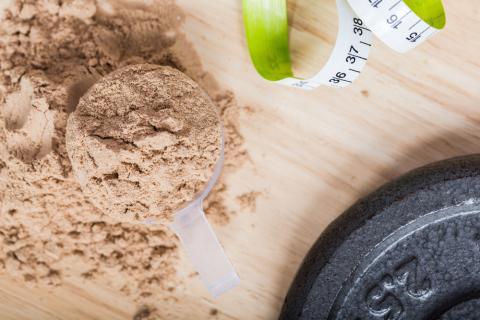
Are whey protein supplements safe? From the definitive ‘yes’ from whey supplement manufacturers to the ‘no’ coming from natural nutritionists, let’s explore the good and the bad of it…
What is whey?
When the milk is turned into cheese, there is a liquid byproduct left – this is called whey. It’s basically a solution of lactose in water comprising lipids (fat) and lactoalbumin – or milk protein. The protein in whey is called whey protein.
Why is whey protein so prized?
Whey protein is high in branched-chain amino acids (BCAAs); BCAAs are one of the nine essential amino acids and are associated with muscle synthesis and repair. ‘Essential’ amino acids cannot be synthesized by us; they have to be consumed via external sources as in the food we eat, or the supplements we take. Basically, BCAAs can be used by the muscles directly as a source of energy – this helps the muscles recover faster after exercise and prevents any damage in the first place. Also, since muscles use this as an energy source, the body glucose levels remain static and the energy levels remain high.
There are three BCAAs found in whey protein:
- Leucine: Along with being important for general health and vitality, leucine helps in blood sugar regulation, hormonal balance and the synthesis and repair of body tissues such as muscles, bones, and skin. It helps the body heal faster – be it from a wound or from excessive and exhaustive exercise.
- Isoleucine: Isoleucine’s primary value lies in hemoglobin production as well as regulating the body’s energy levels. Like leucine, it also helps prevent any breakdown in muscle fibers after strenuous exercise and regulates blood sugar levels.
- Valine: Valine helps muscles recover faster after a workout and is needed by the body to balance the nitrogen content.
Concisely put, Whey protein supplementation increases energy levels, strength, and endurance, as well as speeds up muscle recovery post-workout. It is also helpful for certain medical conditions such as phenylketonuria (where the body cannot metabolize certain amino acids), hepatic encephalopathy (brain toxicity), alcohol-related brain damage and certain neurological disorders.
Whey Protein Supplementation Types
The health-food aisles are filled with all sorts of whey protein supplements – from powders and shakes to gels, oats and even pills and bars. Get to the bottom line and there are four basic kinds of whey protein supplements:
- Whey Protein Isolate: The simplest, cheapest and the most basic form of whey protein – the whey itself is dehydrated into a powder. The downside is that this supplement is also high in fat and lactose. If you are looking for a high-protein supplement only, this one is the wrong choice for it contains anywhere between 30-80% protein, the rest being fat and lactose.
- Whey Protein Concentrate: The most expensive, the highest in protein and the lowest in carbohydrates and fat. The whey protein is concentrated from the whey, leaving out the fat and the lactose. It’s almost 90% pure protein.
- Whey Protein Blend: As the name suggests, this one is a blend of the concentrate and the isolate – thus giving you high protein as well as some carbohydrates and fat for energy – at affordable prices.
- Undenatured Whey: This, according to many new studies, is the best form of whey protein supplements: when whey is pasteurized to increase its shelf life, the proteins in the whey get “denatured” – the heat changes their chemical and physical properties. One of the main components to change is cysteine. The naturally-occurring cysteine helps increase glutathione – better known as the master antioxidant that helps the body “anti-age” the maximum. Once changed, denatured cysteine does not provide the body with the same benefits.
Whey Protein Supplementation Downsides
Ask many endurance athletes and bodybuilders, or even some gym jocks, and they will swear by whey protein supplements. But is it really healthy or even necessary?
- You can get protein the natural way: For a person with normal-to-mildly high activity levels, the amount of protein needed to optimize bodily function is 1gm per kg. For instance, if a man weighs 90 kg, he needs 90gm proteins. If your diet consists of enough eggs, meat, fish, milk, whole grains, nuts, and lentils, you get that much protein naturally – without any supplements. Whether you get whey protein or not is a matter of advanced nutritional study.
- You may be lactose intolerant: Concentrate or blends do contain a high amount of milk fat and lactose – and anyone with a lactose allergy can get a massive reaction from whey protein supplements.
- You may get GI problems: Consuming a large amount of whey protein without the required fat and dietary fiber needed to digest and absorb the same may lead to a large part of the whey protein going into the intestines, undigested. This may cause stomach cramps, painful bloating and indigestion.
So Is Whey Protein Supplementation Safe?
Mostly yes, but like all good things, anything in excess can turn bad for your body. Before you reach for that package of whey protein supplement, go to a nutritionist and do a step-by-step analysis of your diet to answer one important question: do I need whey protein supplement at all? And if yes, can I get it from natural sources instead? Remember that like anything in excess, too much whey will not be good for you...
Happy fitness to you, whey or not!








